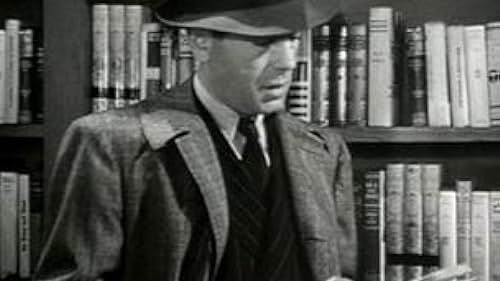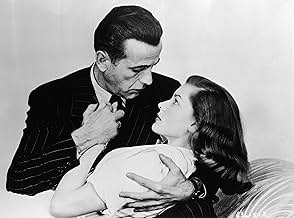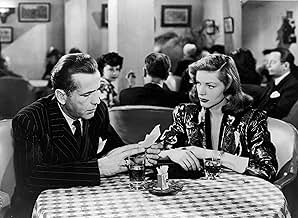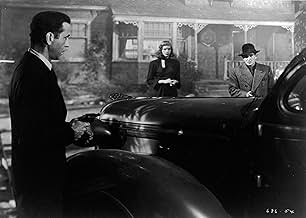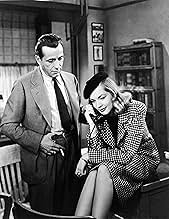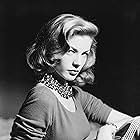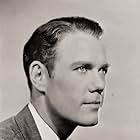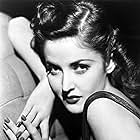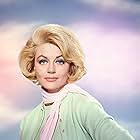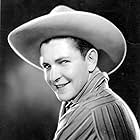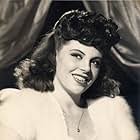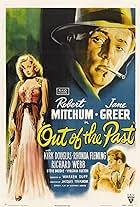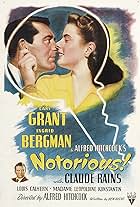Private detective Philip Marlowe is hired by a wealthy family. Before the complex case is over, he's seen murder, blackmail--and what might be love.Private detective Philip Marlowe is hired by a wealthy family. Before the complex case is over, he's seen murder, blackmail--and what might be love.Private detective Philip Marlowe is hired by a wealthy family. Before the complex case is over, he's seen murder, blackmail--and what might be love.
- Awards
- 2 wins total
Trevor Bardette
- Art Huck
- (uncredited)
Joy Barlow
- Taxi Driver
- (uncredited)
Max Barwyn
- Max
- (uncredited)
Deannie Best
- Waitress
- (uncredited)
William A. Boardway
- Casino Patron
- (uncredited)
Tanis Chandler
- Waitress
- (uncredited)
Storyline
Did you know
- TriviaDue to Humphrey Bogart's affair with co-star Lauren Bacall, his marital problems escalated during filming, and his drinking often resulted in his being unable to work. Three months after the film was finished, Bacall and Bogart were married.
- GoofsWhen Vivian is telling Marlowe the cover story for Carmen for the night before, her mouth does not match what she's saying. This mismatch is because the movie was re-edited after Humphrey Bogart and Lauren Bacall became a popular team; To Have and Have Not (1944) which brought them to stardom was released after The Big Sleep (1946) was filmed but before it was released. Scenes were re-shot, some new scenes were added and others dropped. The sequence was also changed to accommodate some of the new edits. The audio/visual mismatch is because the scene was kept but minor dialog had to be changed to make the re-sequencing track properly.
- Quotes
Philip Marlowe: She tried to sit on my lap while I was standing up.
- Crazy creditsDuring the opening credits, Humphrey Bogart and Lauren Bacall are seen in silhouette, placing cigarettes in an ashtray. At the end, two cigarettes are in an ashtray.
- Alternate versionsIt was filmed in 1944 but not released until two years later. Some prints derive from a slightly different early preview version with alternate footage.
- ConnectionsEdited into The Money Trap (1965)
- SoundtracksAnd Her Tears Flowed Like Wine
(uncredited)
Music by Stan Kenton and Charles Lawrence
Lyrics by Joe Greene
Sung by Lauren Bacall and The Williams Brothers
[A band accompanies Vivian singing the song at the casino]
Featured review
THE BIG SLEEP is one of the more entertaining private eye movies I have seen. A dying old man has two beautiful, uncontrollable daughters: Vivien (Lauren Bacall), and Carmen (Martha Vickers). Carmen is being blackmailed, and her father hires P.I. Christopher Marlowe (the beloved Humphrey Bogart) to get the blackmailer off her back. But Marlowe finds that somebody else has done this job for him: the blackmailer is murdered almost under his nose. And as he puts it, "That didn't stop things. That just starts 'em."
I have not read Raymond Chandler's novel, on which this movie was based, but those who have say the title refers to death. That is never explained in the movie. Howard Hawks packs so much plot into 114 minutes of footage that the movie feels like it's bursting at the seams. The story is not incomprehensible as some would have it; while there are many improbable coincidences, there is no element I can point to and say "That couldn't have happened." (Although I'm still not quite sure how Carmen got into Marlowe's apartment). True, the plot really is very hard to follow, and Marlowe's periodic explanations of events, without which the movie would indeed be nonsensical, smack more of inspired guesswork than logical deduction. But the furious pace at which the plot unfolds lends more excitement to the movie than nine out of ten of today's lazily plotted would-be thrillers.
THE BIG SLEEP's greatest strength is its delightfully droll dialogue. When Chandler writes the novel and then Faulkner helps adapt it, you expect some verbal fireworks, and you sure do get them. "How do you like your brandy?" "In a glass." - "You're not very tall, are you?" "I try to be." - "I'm getting cuter every minute." - "Such a lot of guns around town, and so few brains." - "Is it any of your business?" "I could make it my business." "I could make your business mine." "You wouldn't like it. The pay's too small." - "She tried to sit in my lap while I was standing up." Bogie and Bacall get two of the best exchanges; they have a horse-racing discussion where racy double-entendres are dripping like savory sauce off of every word, and they also get a truly hilarious telephone conversation where Marlowe convinces Vivien not to call the police.
But THE BIG SLEEP has a harder side that is also effective. It is shockingly violent for a movie produced under the stern eyes of the Hayes code censors. The movie is too unpredictable to generate much suspense (you can't dread something you don't know is going to happen), but the ending is one of the most intense, nailbiting scenes you'll ever see.
The 1940s were not a great era for film music, which makes Max Steiner's brooding score all the more impressive. The print I saw was very low-quality, so I can't judge the cinematography.
The acting is wonderful. Bogart gets to show his chops at one point by switching off the hard-boiled personality he developed for THE MALTESE FALCON and impersonating an antiquarian bookworm. Bacall radiates class whether she's at ease smoking in a cafe or outwitting a man holding her at gunpoint. Martha Vickers' Carmen strikes the perfect balance of appealing seductiveness and outright nastiness.
One final note: this movie is almost Bond-like in terms of the number of appallingly beautiful women Marlowe accidentally encounters, all of whom seem to have a burning desire for him. Even his taxi driver wants him. Dorothy Malone, whose character name we never learn, plays the sexiest book seller you will ever meet (and yes, she wears glasses; eat your heart out, Dorothy Parker!). Minus fifty points for credibility, plus a hundred points for entertainment. Regrettably, I cannot promise similar thrills for the female audience; it just kind of depends on how you like Men In Suits.
Rating: ***1/2 out of ****.
I have not read Raymond Chandler's novel, on which this movie was based, but those who have say the title refers to death. That is never explained in the movie. Howard Hawks packs so much plot into 114 minutes of footage that the movie feels like it's bursting at the seams. The story is not incomprehensible as some would have it; while there are many improbable coincidences, there is no element I can point to and say "That couldn't have happened." (Although I'm still not quite sure how Carmen got into Marlowe's apartment). True, the plot really is very hard to follow, and Marlowe's periodic explanations of events, without which the movie would indeed be nonsensical, smack more of inspired guesswork than logical deduction. But the furious pace at which the plot unfolds lends more excitement to the movie than nine out of ten of today's lazily plotted would-be thrillers.
THE BIG SLEEP's greatest strength is its delightfully droll dialogue. When Chandler writes the novel and then Faulkner helps adapt it, you expect some verbal fireworks, and you sure do get them. "How do you like your brandy?" "In a glass." - "You're not very tall, are you?" "I try to be." - "I'm getting cuter every minute." - "Such a lot of guns around town, and so few brains." - "Is it any of your business?" "I could make it my business." "I could make your business mine." "You wouldn't like it. The pay's too small." - "She tried to sit in my lap while I was standing up." Bogie and Bacall get two of the best exchanges; they have a horse-racing discussion where racy double-entendres are dripping like savory sauce off of every word, and they also get a truly hilarious telephone conversation where Marlowe convinces Vivien not to call the police.
But THE BIG SLEEP has a harder side that is also effective. It is shockingly violent for a movie produced under the stern eyes of the Hayes code censors. The movie is too unpredictable to generate much suspense (you can't dread something you don't know is going to happen), but the ending is one of the most intense, nailbiting scenes you'll ever see.
The 1940s were not a great era for film music, which makes Max Steiner's brooding score all the more impressive. The print I saw was very low-quality, so I can't judge the cinematography.
The acting is wonderful. Bogart gets to show his chops at one point by switching off the hard-boiled personality he developed for THE MALTESE FALCON and impersonating an antiquarian bookworm. Bacall radiates class whether she's at ease smoking in a cafe or outwitting a man holding her at gunpoint. Martha Vickers' Carmen strikes the perfect balance of appealing seductiveness and outright nastiness.
One final note: this movie is almost Bond-like in terms of the number of appallingly beautiful women Marlowe accidentally encounters, all of whom seem to have a burning desire for him. Even his taxi driver wants him. Dorothy Malone, whose character name we never learn, plays the sexiest book seller you will ever meet (and yes, she wears glasses; eat your heart out, Dorothy Parker!). Minus fifty points for credibility, plus a hundred points for entertainment. Regrettably, I cannot promise similar thrills for the female audience; it just kind of depends on how you like Men In Suits.
Rating: ***1/2 out of ****.
Details
- Release date
- Country of origin
- Official site
- Language
- Also known as
- Tote schlafen fest
- Filming locations
- Production company
- See more company credits at IMDbPro
Box office
- Budget
- $250,000 (estimated)
- Gross US & Canada
- $25,556
- Gross worldwide
- $51,050
- Runtime1 hour 54 minutes
- Color
- Aspect ratio
- 1.37 : 1
Contribute to this page
Suggest an edit or add missing content


